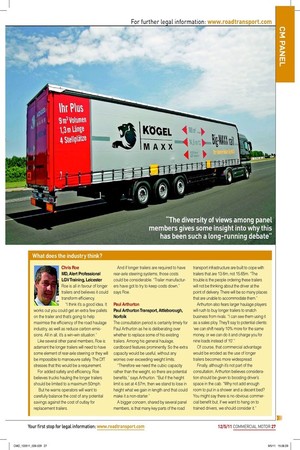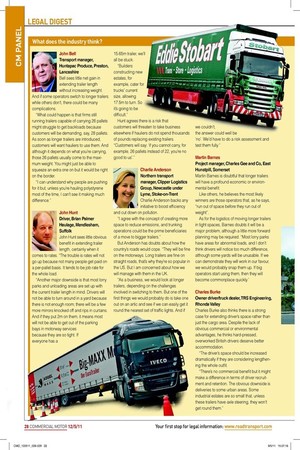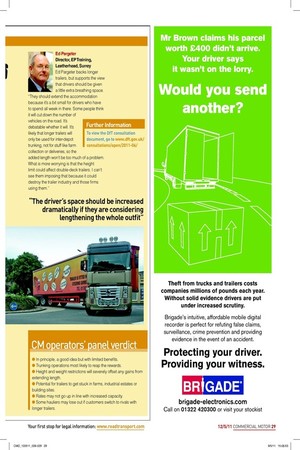What does the industry think?
Page 21

Page 22

Page 23

If you've noticed an error in this article please click here to report it so we can fix it.
Chris Roe MD, Alert Professional LGV Training, Leicester Roe is all in favour of longer trailers and believes it could transform efficiency.
“I think it’s a good idea. It works out you could get an extra few pallets on the trailer and that’s going to help maximise the efficiency of the road haulage industry, as well as reduce carbon emissions. All in all, it’s a win-win situation.” Like several other panel members, Roe is adamant the longer trailers will need to have some element of rear-axle steering or they will be impossible to manoeuvre safely. The DfT stresses that this would be a requirement.
For added safety and efficiency, Roe believes trucks hauling the longer trailers should be limited to a maximum 50mph.
But he warns operators will want to carefully balance the cost of any potential savings against the cost of outlay for replacement trailers. And if longer trailers are required to have rear-axle steering systems, those costs could be considerable. “Trailer manufacturers have got to try to keep costs down,” says Roe.
Paul Arthurton Paul Arthurton Transport, Attleborough, Norfolk The consultation period is certainly timely for Paul Arthurton as he is deliberating over whether to replace some of his existing trailers. Among his general haulage, cardboard features prominently. So the extra capacity would be useful, without any worries over exceeding weight limits.
“Therefore we need the cubic capacity rather than the weight, so there are potential benefits,” says Arthurton. “But if the height limit is set at 4.57m, then we stand to lose in height what we gain in length and that could make it a non-starter.” A bigger concern, shared by several panel members, is that many key parts of the road transport infrastructure are built to cope with trailers that are 13.6m, not 15.65m. “The trouble is the people ordering these trailers will not be thinking about the driver at the point of delivery. There will be so many places that are unable to accommodate them.” Arthurton also fears larger haulage players will rush to buy longer trailers to snatch business from rivals. “I can see them using it as a sales ploy. They’ll say to potential clients: ‘we can shift nearly 10% more for the same money, or we can do it and charge you for nine loads instead of 10’.” Of course, that commercial advantage would be eroded as the use of longer trailers becomes more widespread.
Finally, although it’s not part of the consultation, Arthurton believes consideration should be given to boosting driver’s space in the cab. “Why not add enough room to put in a shower and a decent bed? You might say there is no obvious commercial benefit but, if we want to hang on to trained drivers, we should consider it.” John Bell Transport manager, Huntapac Produce, Preston, Lancashire Bell sees little net gain in extending trailer length without increasing weight.
And if some operators switch to longer trailers while others don’t, there could be many complications.
“What could happen is that firms still running trailers capable of carrying 26 pallets might struggle to get backloads because customers will be demanding, say, 28 pallets. As soon as longer trailers are introduced, customers will want hauliers to use them. And although it depends on what you’re carrying, those 26 pallets usually come to the maximum weight. You might just be able to squeeze an extra one on but it would be right on the border.
“I can understand why people are pushing for it but, unless you’re hauling polystyrene most of the time, I can’t see it making much difference.” John Hunt Driver, Brian Palmer Haulage, Mendlesham, Suffolk John Hunt sees little obvious benefit in extending trailer length, certainly when it comes to rates. “The trouble is rates will not go up because not many people get paid on a per-pallet basis. It tends to be job rate for the whole load.
“Another major downside is that most lorry parks and unloading areas are set up with the current trailer length in mind. Drivers will not be able to turn around in a yard because there is not enough room; there will be a few more mirrors knocked off and rips in curtains. And if they put 2m on them, it means most will not be able to get out of the parking bays in motorway services because they are so tight. If everyone has a 15.65m trailer, we’ll all be stuck.
“Builders constructing new estates, for example, cater for trucks’ current size, allowing 17.5m to turn. So it’s going to be difficult.” Hunt agrees there is a risk that customers will threaten to take business elsewhere if hauliers do not spend thousands of pounds replacing existing trailers.
“Customers will say: ‘if you cannot carry, for example, 26 pallets instead of 22, you’re no good to us’.” Charlie Anderson Northern transport manager, Clipper Logistics Group, Newcastle under Lyme, Stoke-on-Trent Charlie Anderson backs any initiative to boost efficiency and cut down on pollution.
“I agree with the concept of creating more space to reduce emissions, and trunking operations could be the prime beneficiaries of a move to bigger trailers.” But Anderson has doubts about how the country’s roads would cope. “They will be fine on the motorways. Long trailers are fine on straight roads, that’s why they’re so popular in the US. But I am concerned about how we will manage with them in the UK.
“As a business, we would look at longer trailers, depending on the challenges involved in switching to them. But one of the first things we would probably do is take one out on an artic and see if we can easily get it round the nearest set of traffic lights. And if we couldn’t, the answer could well be ‘no’. We’d have to do a risk assessment and test them fully.” Martin Barnes Project manager, Charles Gee and Co, East Hunstpill, Somerset Martin Barnes is doubtful that longer trailers will have a profound economic or environmental benefit.
Like others, he believes the most likely winners are those operators that, as he says, “run out of space before they run out of weight”.
As for the logistics of moving longer trailers in tight spaces, Barnes doubts it will be a major problem, although a little more forward planning may be required. “Most lorry parks have areas for abnormal loads, and I don’t think drivers will notice too much difference, although some yards will be unusable. If we can demonstrate they will work in our favour, we would probably snap them up. If big operators start using them, then they will become commonplace quickly.’ Charles Burke Owner driver/truck dealer, TRS Engineering, Rhonda Valley Charles Burke also thinks there is a strong case for extending driver’s space rather than just the cargo area. Despite the lack of obvious commercial or environmental advantages, he thinks hard-pressed, overworked British drivers deserve better accommodation.
“The driver’s space should be increased dramatically if they are considering lengthening the whole outfit.
“There’s no commercial benefit but it might make a difference in terms of driver recruitment and retention. The obvious downside is deliveries to some urban areas. Some industrial estates are so small that, unless these trailers have axle steering, they won’t get round them.” Ed Pargeter Director, EP Training, Leatherhead, Surrey Ed Pargeter backs longer trailers, but supports the view that drivers should be given a little extra breathing space.
“They should extend the accommodation because it’s a bit small for drivers who have to spend all week in there. Some people think it will cut down the number of vehicles on the road. It’s debatable whether it will. It’s likely that longer trailers will only be used for inter-depot trunking, not for stuff like farm collection or deliveries, so the added length won’t be too much of a problem.
What is more worrying is that the height limit could affect double-deck trailers. I can’t see them imposing that because it could destroy the trailer industry and those firms using them.”
CM operators’ panel verdict
● In principle, a good idea but with limited benefits.
● Trunking operations most likely to reap the rewards.
● Height and weight restrictions will severely offset any gains from extending length.
● Potential for trailers to get stuck in farms, industrial estates or building sites.
● Rates may not go up in line with increased capacity.
● Some hauliers may lose out if customers switch to rivals with longer trailers.












































